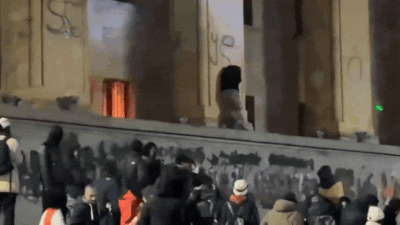
Violent clashes erupted outside Georgia’s parliament between law enforcement and protesters opposing the government’s choice to postpone European Union membership discussions during a post-election crisis, on Saturday. For the third consecutive night, thousands gathered in Tbilisi, Georgia’s capital, resulting in numerous arrests.
Following the ruling Georgian Dream party‘s declared victory in the October 26 parliamentary election, which pro-European opposition claimed was fraudulent, the Black Sea nation has experienced significant unrest.
Police use force to disperse crowds
Police officers in protective gear deployed rubber bullets, tear gas and water cannons to scatter protesters who were launching fireworks. Flames were observed emerging from parliament’s window, whilst demonstrators constructed barriers on Tbilisi’s primary thoroughfare.
Mass arrests amid escalating protests
“I am afraid — I won’t hide it — that many people will get injured, but I am not afraid to stand here,” 39-year-old Tamar Gelashvili told AFP near the parliament building earlier in the day.
Demonstrations spread across various Georgian cities. The interior ministry said that “the actions of some individuals present at the protest became violent shortly after the demonstration began”. Over 100 individuals were detained during the previous two days when authorities confronted protesters using water cannons and tear gas.
PM’s announcement fuels opposition outrage
Prime Minister Irakli Kobakhidze’s Thursday announcement about delaying EU accession talks until 2028 sparked opposition outrage.
Georgian Dream, which has governed for over ten years, faces accusations of steering the country away from the EU and towards Russia, claims they reject. Numerous public servants, including staff from foreign affairs, defence and education ministries, alongside judges, issued statements opposing Kobakhidze’s decision.
Approximately 160 Georgian diplomats criticised the decision as unconstitutional and leading to “international isolation”. Several ambassadors resigned in protest.
President pushes for stability amid crisis
The situation escalated with police confrontations, media targeting, and widespread academic protests. Pro-Western opposition parties are boycotting parliament, while President Salome Zurabishvili challenges election results through constitutional court.
In an AFP interview on Saturday, Zurabishvili announced establishing a “national council” comprising opposition parties and civil society representatives to maintain stability, saying, “I will be the representative of this legitimate, stable transition.”
The international community, including the US, France, Britain, and others, condemned the crackdown. The US suspended its Strategic Partnership with Georgia, while the OSCE expressed serious concerns about law enforcement’s handling of peaceful protests.






